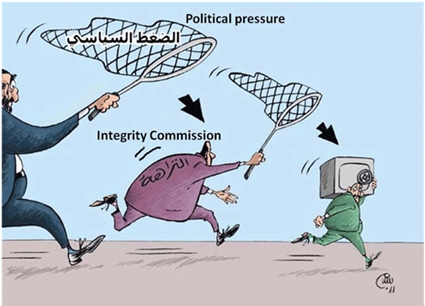Corruption in Iraq
Corruption is dangerously rampant in Iraq, leading to direct human rights violations. This is despite Iraq acceding to the UN Convention Against Corruption (CAC). Iraq is neither honoring its international commitments, nor its duty to safeguard the rights of its people.
Corruption is seen in business, governance; the oil, electricity, and health sectors, among others. It takes various forms -- bribery, illegal government contracting, and fraudulent government staffing (overstating the number of employees to receive and pocket a higher budget for that office).
|
|
In addition to causing billions of dollars’ worth of damage, the extent of corruption violates people’s right to healthcare and an adequate standard of living, and children’s right to education. Corruption in the justice system means unfair sentences, a lack of accountability, and people have to pay through their nose to be treated with dignity in the trial process. Finally, discrimination is legitimized through corruption, specifically targeting vulnerable populations.
GICJ is appalled at the scale of corruption in Iraq, and the government’s inability or unwillingness to stem it since 2003. Our report to the UNHRC calls on all stakeholders- the Iraqi government, international community, and the UN itself- to step up and put an end to corruption in Iraq.
Therefore, Geneva International Centre for Justice (GICJ) recommended that:
- Iraq government pursue its stated efforts to prosecute high-profile corrupt practices and begin reducing the overall culture of corruption
- The international community and trans-national corporations operating in Iraq reject corrupt practices and work toward greater transparency in their activities within Iraq
- The Human Rights Council appoint a special rapporteur for Iraq to, among other functions, investigate and monitor corruption and its impact on the human rights of Iraqis
Link to full Written Statement.




 Source: The Baghdad Post
Source: The Baghdad Post


